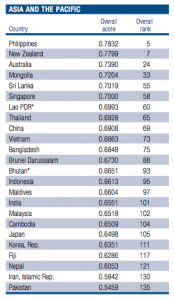By Teo Nie Ching, Member of Parliament for Kulai
 Last year, Malaysia was ranked 100th among 135 countries in the Global Gender Gap Index with the score of 0.6539. However, in the latest Global Gender Gap Report 2013 published by the World Economic Forum[1], Malaysia demonstrates a change of score of -0.0021 and slips 2 places to 102nd among 136 countries.
Last year, Malaysia was ranked 100th among 135 countries in the Global Gender Gap Index with the score of 0.6539. However, in the latest Global Gender Gap Report 2013 published by the World Economic Forum[1], Malaysia demonstrates a change of score of -0.0021 and slips 2 places to 102nd among 136 countries.
As a matter of fact, Malaysia has very little change in score since the first publication of this report.
The Global Gender Gap Index was first published in 2006 with a view to creating a comprehensive gender parity index that is able to track gaps over time relative to an equality benchmark, thus providing information on a country’s progress relative to itself as well as to other countries.
Based on the eight years of data available for the
110 countries that have been part of the Report since its inception, the majority of countries covered have made progress on closing gender gaps.[2] Out of 110 countries that were covered consistently between 2006
and 2013, 95 countries have shown positive progress over the last eight years,[3] with Malaysia being the country which shown the least improvement, whereas most of our neighboring countries in Asia have shown significant progress.
|
Country |
2006 score |
2013 score |
Change in Score (2006 – 2013) |
Percentage change relative to 2006 score |
|
Singapore |
0.6550 |
0.7000 |
0.0450 |
6.9 |
|
Mongolia |
0.6821 |
0.7200 |
0.0379 |
5.6 |
|
China |
0.6561 |
0.6910 |
0.0349 |
5.3 |
|
Philippines |
0.7516 |
0.7830 |
0.0314 |
4.2 |
|
Cambodia |
0.6291 |
0.6510 |
0.0219 |
3.5 |
|
Korea Rep. |
0.6157 |
0.6350 |
0.0193 |
3.1 |
|
Thailand |
0.6831 |
0.6930 |
0.0099 |
1.4 |
|
Indonesia |
0.6541 |
0.6610 |
0.0069 |
1.1 |
|
Japan |
0.6447 |
0.6500 |
0.0053 |
0.8 |
|
Malaysia |
0.6509 |
0.6520 |
0.0011 |
0.2 |
Women Ministry was officially established in Malaysia in January 2001 with Datuk Seri Shahrizat Abdul Jalil acting as the first cabinet level Minister to solely focus on the policies and direction to achieve gender equality. After Shahrizat stepped down in April last year, Najib even assumed the role of Women Development Minister. Yet, Malaysia is still ranked in the bottom third among the upper-middle income countries and Asia and the pacific region.
Najib and Shahrizat should be ashamed of their inefficiency in closing the gender gap and women empowerment. Countries can be competitive only if they develop, attract and retain the best talent, both male and female. BN administration has failed to understand that gender equality matters to Malaysia’s development because the “absent women” represent a skills and brain drain from the Malaysian workforce. So how could the women in Malaysia expect a better tomorrow if BN continues to rule?
[1] Download the report: http://www3.weforum.org/docs/WEF_GenderGap_Report_2013.pdf [2] In 2006, 14% of the global political empowerment gap had been closed; in 2013, 21% of this gap has been closed. In 2006, 56% of the economic participation gap had been closed; in 2013, 60% of this gap has been closed. In 2006, almost 92% of the educational attainment gap had been closed; in 2013, 93% of this gap has been closed. On health and survival, however, there has been a small deterioration between 2006 and 2013, from 97% to 96%. [3] One country has shown zero progress while fourteen countries have shown negative progress over the last eight years. (page 40 of the Report)




